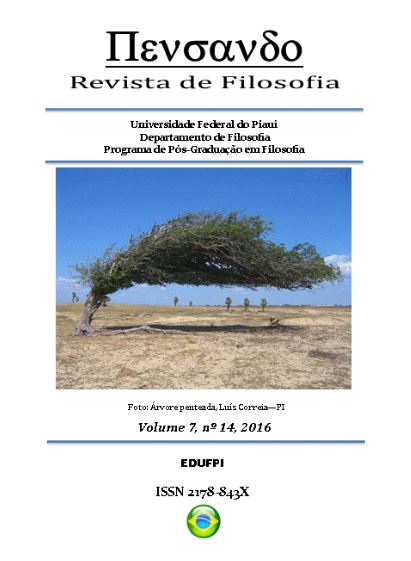MALTHUS ON SEX, PROCREATION, AND APPLIED ETHICS
DOI :
https://doi.org/10.26694/pensando.v7i14.4940Mots-clés :
population, poverty, virtues, sex, applied ethicsRésumé
I argue that Malthus’s Essay on Population is more a treatise in applied ethics than the first treatise in demography. I argue also that, as an ethical work, it is a highly innovative one. The substitution of procreation for sex as the focus makes for a drastic change in the agenda. What had been basically lacking in the discussion up to Malthus’s time was a consideration of human beings’ own responsibility in the decision of procreating. This makes for a remarkable change also in the approach, namely, the discussion becomes an examination of a well-identified issue, taking cause-effect relationships into account in order to assess possible lines of conduct in the light of some, widely shared and comparatively minimal, value judgements. This is more or less the approach of what is now called applied ethics, at least according to one of its accounts, or perhaps to the account shared by a vast majority of its practitioners. In a sense, both the subject matter, sexuality, was substituted with a more restricted issue, namely reproduction, and the traditional approach, moral doctrine, was substituted with a more modest approach, in Malthus’s own words, the “moral and political science”. Such a drastic transformation brought about a viable framework, for a discussion of ethical issues that were still unforeseen by Malthus, namely those having to do first with the technical feasibility of eugenics programs and secondly with the scientific discovery of genetics as a field of study but also of possible intervention. Malthus’s ethics had obviously enough nothing to say on those unforeseen issues in so far as it was meant to treat just the ‘quantitative’ dimension of procreation, that is, “how many”. Later discussions and controversies will arise around different dimensions, that is, not just ‘how many’ but also ‘how healthy, how strong, how far empowered’. Yet, what Malthus’s lesson can still teach to proponents of opposite views is that the mentioned questions can be construed in such a way as to avoid unending controversy.
Références
Anonymous (2016). «Thomas Robert Malthus e sua teoria.», retrievable at: http://educacao.uol.com.br/biografias/thomas-robert-malthus.htm (accessed https://pt.wikipedia.org/wiki/26_de_mar%C3%A7o May 7th 2016)
Bonar J. ([1885] 1996). Malthus and his Work. London: Cass.
Cantillon R. ([1755] 2003). Essai sur la nature du commerce en général, Milan: Fondazione Giangiacomo Feltrinelli (Engl. transl. Essay on the nature of commerce in general, New Brunswick, NJ: Transaction Publishers, 2001).
Cremaschi S. (2008). ‘Utilitarianism and its British Nineteenth-Century Critics’, Notizie di Politeia, 24 (90): 31-49.
Cremaschi S. (2010). ‘Malthus’s Idea of a Moral and Political Science’, The Journal of Philosophical Economics, 3 (2): 5-57.
Cremaschi S. (2012). ‘Malthus dalla morale sessuale all’etica della procreazione’, in R. Mordacci and M. Loi (eds.), Etica e genetica. Storia, concetti e pratiche, Milan: Bruno Mondadori 2012, pp. 3-22.
Cremaschi S. (2013). ‘Malthus’s war on poverty as moral reform’, Centre for Research and Interdisciplinary Studies Bulletin. Prague College, no. 9 (20132): 43-54.
Cremaschi S. (2014). Utilitarianism and Malthus’s Virtue Ethics. Respectable, Virtuous, and Happy, Abingdon: Routledge.
Godwin W. ([1801] 1993). Thoughts Occasioned by the Perusal of Dr. Parr’s Spital Sermon, in Political and Philosophical Writings of William Godwin, 7 vols, ed. by M. Philp, London. Pickering.
Hollander S. (1989). ‘Malthus and Utilitarianism with Special Reference to the Essay on Population’, Utilitas, 1: 170-210.
Hollander S. (1997), The Economics of Thomas Robert Malthus, Toronto: University of Toronto Press.
Hume D. ([1752] 1992). Of the Populousness of Ancient Nations, in The Philosophical Works, 4 vols., ed. by Th.H. Green and Th.H. Grose, Scientia Verlag, Aalen, vol. 3, pp. 381-443.
Jensen H.E. (1999). ‘The Development of T.R. Malthus’s Institutionalist Approach to the Cure of Poverty: from Punishment of the Poor to Investment in their Human Capital’, Review of Social Economy, 57 (2): 450-465.
Malthus Th. R. ([1820] 1989). Principles of Political Economy. Variorum Edition Edited by J. Pullen. 2 vols., Cambridge: Cambridge University Press.
Malthus Th.R. ([1798] 1986). An Essay on the Principle of Population, in The Works of Thomas Robert Malthus, 8 vols., ed. by E.A. Wrigley and D. Souden, London: Pickering, vol. 1.
Malthus Th.R. ([1807] 1986). Letter to Samuel Whitbread Esq. M.P. on his Proposed Bill for the Amendment of the Poor Laws, in The Works of Thomas Robert Malthus, 8 voll., ed. By E.A. Wrigley D. Souden, Pickering London, vol. 4, pp. 5-19.
Malthus Th.R. (1803). An Essay on the Principle of Population, 2 vols., ed. by P. James, Cambridge University Press, Cambridge 1989.
Masi M. (2011). ‘I bambini difettosi vittime dell’eugenetica nazista’, itali@magazine January 29, retrievable online at www.italiamagazineonline.it/
Mayhew R.J. (2014). Malthus: The Life and Legacies of an Untimely Prophet, Cambridge (Mass): Harvard University Press.
Ryan J. A. (1911), ‘Population, Theories of’, in The Catholic Encyclopedia, 16 vols., ed. by Ch. G. Herbermann et al., New York: The Encyclopedia Press 1913-1914, vol. 12, pp. 276-280.
Smith A. ([1776] 1976). An Inquiry into the Nature and Causes of the Wealth of Nations. 2 vols., ed. by R.H. Campbell, A.S. Skinner, W.B. Todd. Oxford: Clarendon.
Tertullianus, Quintus Septimius Florens (2010). De anima, in Opere dottrinali (Latin/Italian), vol. 2, ed. by C. Moreschini and P. Podolak, Rome: Città nuova.
Wallace, R. (1761). Various Prospects on Mankind, Nature, and Providence. London.
Téléchargements
Publiée
Comment citer
Numéro
Rubrique
Licence
Consulter: https://creativecommons.org/licenses/by/4.0/

























